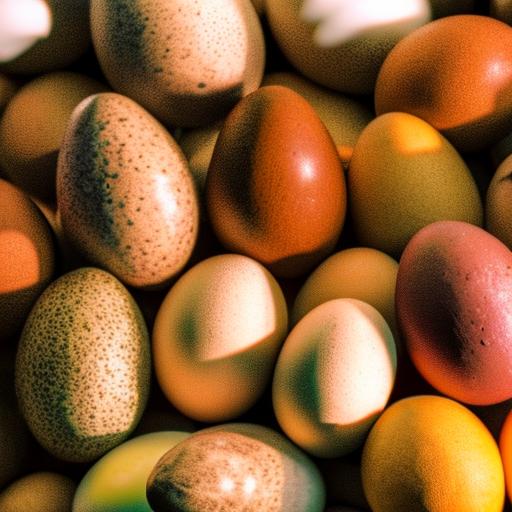Black meat chicken breeds, also known as Silkie chickens, are a distinctive type of poultry characterized by their dark-colored skin, bones, and meat. These chickens have been cultivated in Asia for centuries and have recently gained popularity in other parts of the world due to their unique culinary properties and appearance. The most notable feature of black meat chickens is their dark pigmentation, which extends beyond their feathers to their skin, bones, and internal organs.
This coloration is caused by a genetic condition called fibromelanosis, which results in an excess of melanin throughout the bird’s body. Silkie chickens, the most well-known black meat breed, have a distinctive appearance with fluffy, fur-like feathers. They are known for their gentle temperament, making them popular as pets and show birds.
These chickens are also prized for their strong brooding instincts, making them excellent mothers for hatching and raising chicks. Black meat chickens are valued in various cuisines, particularly in Asian countries, for their unique flavor and texture. The meat is often described as having a richer, more complex taste compared to conventional chicken breeds.
In recent years, black meat chicken breeds have become increasingly popular among backyard poultry enthusiasts and small-scale farmers. This growing interest is due to their distinctive appearance, culinary qualities, and gentle nature. However, raising these birds can present unique challenges, including specific dietary requirements and potential health issues related to their genetic makeup.
Table of Contents
Key Takeaways
- Black meat chicken breeds are known for their unique appearance and dark-colored meat, which is considered a delicacy in many cultures.
- These breeds are typically smaller in size and have a slower growth rate compared to traditional broiler chickens.
- Some popular black meat chicken breeds include the Silkie, Ayam Cemani, and Kadaknath, each with their own distinct characteristics and origins.
- Breeding and raising black meat chickens requires careful attention to their specific dietary and environmental needs to ensure optimal growth and health.
- The benefits of black meat chicken breeds include their unique meat quality, potential for specialty market opportunities, and cultural significance, but they also present challenges in terms of breeding and raising due to their specific requirements.
Characteristics of Black Meat Chicken Breeds
Distinctive Appearance and Gentle Nature
Black meat chicken breeds are renowned for their striking appearance, featuring fluffy feathers that resemble fur and dark-colored skin and meat. These chickens come in a variety of colors, including black, white, blue, and splash, with the black variety being the most popular. The feathers of black meat chickens are soft and silky, lacking the barbicels that hold traditional feathers together, giving them a unique appearance and texture. In addition to their distinctive appearance, black meat chickens are also known for their gentle and friendly nature, making them popular pets and show birds.
Broodiness and Culinary Qualities
Black meat chickens are also known for their broodiness, making them excellent mothers for hatching and raising chicks. Moreover, their dark-colored skin and meat are highly prized in Asian cuisine, making them a popular choice for cooking. The dark color of the meat is due to a higher concentration of melanin in the skin and muscle tissues, giving the meat a unique flavor and texture.
A Popular Choice for Backyard Enthusiasts and Small-Scale Farmers
With their unique appearance and culinary qualities, black meat chicken breeds have become a popular choice for backyard poultry enthusiasts and small-scale farmers alike. The dark color of the skin and meat also makes them visually striking when served, adding an element of novelty to any dish. Overall, black meat chicken breeds are a unique and delicious addition to any flock.
Popular Black Meat Chicken Breeds

There are several popular black meat chicken breeds that are sought after for their unique characteristics and culinary qualities. One of the most well-known black meat chicken breeds is the Silkie chicken, which is prized for its fluffy feathers, dark-colored skin and meat, and gentle nature. Silkies come in a variety of colors, including black, white, blue, and splash, with the black variety being the most popular.
Another popular black meat chicken breed is the Ayam Cemani, which is native to Indonesia and is known for its entirely black appearance, including its feathers, skin, bones, and internal organs. The Ayam Cemani is highly prized for its unique appearance and is often used in traditional Indonesian rituals and ceremonies. In addition to Silkies and Ayam Cemani, there are other black meat chicken breeds that are gaining popularity in the poultry industry.
The Kadaknath chicken, native to India, is known for its black feathers, skin, and meat, as well as its high protein content and low fat levels. This breed is highly prized for its culinary qualities and is often used in traditional Indian dishes. Another popular black meat chicken breed is the Swedish Black Hen, which is known for its dark-colored skin and meat, as well as its gentle nature and broodiness.
These are just a few examples of the many black meat chicken breeds that are sought after for their unique characteristics and culinary qualities.
Breeding and Raising Black Meat Chickens
Breeding and raising black meat chickens requires careful attention to their unique characteristics and needs. When breeding black meat chickens, it is important to select birds with the desired traits, such as dark-colored skin and meat, fluffy feathers, and gentle nature. Breeding for these traits can be challenging, as they are controlled by multiple genes and can be influenced by environmental factors.
It is important to carefully select breeding stock that exhibits the desired traits and to avoid inbreeding in order to maintain genetic diversity and overall health. When raising black meat chickens, it is important to provide them with a suitable environment that meets their specific needs. These chickens require adequate space to roam and forage, as well as protection from predators and extreme weather conditions.
They also require a balanced diet that provides the necessary nutrients for healthy growth and development. Additionally, black meat chickens require regular grooming to maintain their fluffy feathers and overall health. Providing proper care and attention to black meat chickens is essential for ensuring their well-being and maximizing their potential as show birds or for culinary purposes.
Benefits of Black Meat Chicken Breeds
Black meat chicken breeds offer several benefits that make them a popular choice for backyard poultry enthusiasts and small-scale farmers. One of the main benefits of black meat chickens is their unique culinary qualities. The dark-colored skin and meat of these chickens have a distinct flavor and texture that is highly prized in Asian cuisine.
This makes them a popular choice for cooking traditional dishes as well as adding novelty to modern recipes. In addition to their culinary qualities, black meat chickens are also known for their gentle nature, making them popular pets and show birds. Their fluffy feathers and unique appearance make them a favorite among poultry enthusiasts.
Another benefit of black meat chicken breeds is their broodiness, which makes them excellent mothers for hatching and raising chicks. This makes them a valuable asset for small-scale farmers who want to raise their own chicks without relying on an incubator or broody hen. Additionally, black meat chickens are known for their high protein content and low fat levels, making them a healthy choice for those looking to incorporate more protein into their diet without consuming excess fat.
Overall, the unique culinary qualities, gentle nature, broodiness, and nutritional value of black meat chicken breeds make them a valuable addition to any poultry flock.
Challenges of Raising Black Meat Chickens

Maintenance of Distinctive Appearance
One of the main challenges of raising black meat chickens is maintaining their unique appearance. Their fluffy feathers require regular grooming to prevent matting and tangling, which can be time-consuming and labor-intensive.
Health Monitoring and Breeding
Additionally, the dark color of their skin and meat can make it difficult to detect any abnormalities or health issues that may arise. This requires careful observation and regular health checks to ensure that they remain in good condition. Breeding for specific traits such as dark-colored skin and meat can also be challenging, as these traits are controlled by multiple genes and can be influenced by environmental factors.
Specialized Care and Attention
Providing proper care and attention to black meat chickens can be demanding due to their specific needs for space, protection from predators, a balanced diet, and regular grooming. Inbreeding must be avoided in order to maintain genetic diversity and overall health within the flock.
Despite these challenges, many poultry enthusiasts find the unique qualities of black meat chickens to be worth the extra effort required to care for them.
The Future of Black Meat Chicken Breeds
Black meat chicken breeds have gained popularity in recent years due to their unique appearance, culinary qualities, gentle nature, broodiness, and nutritional value. As more people become interested in raising poultry for both traditional purposes and as pets or show birds, the demand for black meat chickens is likely to continue growing. With careful breeding practices and proper care and attention, these unique birds can thrive in a variety of environments and provide valuable benefits to those who raise them.
While there are challenges associated with caring for black meat chickens, many poultry enthusiasts find that the rewards far outweigh the extra effort required to maintain these special birds. As interest in sustainable agriculture and traditional culinary practices continues to grow, black meat chicken breeds are likely to play an important role in meeting these demands in the future.
If you’re interested in learning more about different breeds of meat chickens, you might also want to check out this article on how many chickens you need for a family of 4. It provides valuable information on the number of chickens required to meet the egg and meat needs of a typical family.
FAQs
What are black meat chicken breeds?
Black meat chicken breeds are a group of chicken breeds that are known for their dark-colored meat. These breeds are often sought after for their unique flavor and are popular in certain culinary traditions.
What are some examples of black meat chicken breeds?
Some examples of black meat chicken breeds include the Ayam Cemani, Kadaknath, and Silkie. These breeds are known for their dark-colored flesh and are often used in traditional Asian cuisine.
What gives black meat chicken breeds their dark color?
The dark color of the meat in black meat chicken breeds is due to a genetic trait called fibromelanosis, which causes the birds to have black skin, bones, and internal organs. This trait is unique to these specific breeds.
Are black meat chicken breeds popular for meat production?
While black meat chicken breeds are not as widely used for meat production as traditional broiler breeds, they are popular in certain culinary circles for their unique flavor and appearance. They are often considered a delicacy in some cultures.
What are the characteristics of black meat chicken breeds?
Black meat chicken breeds are known for their distinctive black skin, bones, and internal organs. They often have a smaller size and are valued for their dark-colored meat, which is said to have a richer flavor compared to traditional chicken breeds.
Meet Walter, the feathered-friend fanatic of Florida! Nestled in the sunshine state, Walter struts through life with his feathered companions, clucking his way to happiness. With a coop that’s fancier than a five-star hotel, he’s the Don Juan of the chicken world. When he’s not teaching his hens to do the cha-cha, you’ll find him in a heated debate with his prized rooster, Sir Clucks-a-Lot. Walter’s poultry passion is no yolk; he’s the sunny-side-up guy you never knew you needed in your flock of friends!







